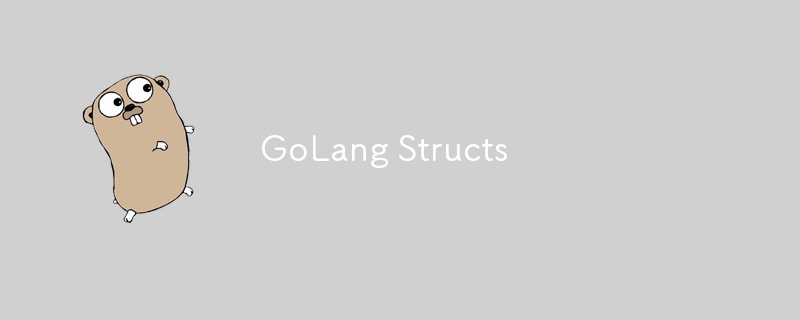

In Golang, structs are simple containers for data.
The following show a simple Book class equivalents in Ruby and GoLang.
class Book attr_reader(:title, :author) def initalize(title, author) @title = title @author = authoer end end # usage book = Book.new('Title', 'Jon Snow')
// Equivalent to `class Book` in ruby type Book struct { Title string, Author string }
Composite Literal is syntax to create an initialise composite types in one step. We can instantiate the following types:
Here we are assigning a new Book instance to the variable book
// Composite Literal book := Book{ Title: "Title", Author: "Author" }
The longer form is to use the new keyword. This would be similar to the way we would instantiate a class in Ruby with book = Book.new(..)
We would assign the attributes of the book (i.e. Title and Author) using = sign.
// Using the `new` keyword book := new(Book) book.Title = "Book Title" book.Author = "John Snow"
Notice that we used the symbol := in the first example?
It's syntactic sugar for the following verbose way of declaring a variable and assigning it a value.
// Without Short Virable Declaration // Example 1 var book Book // Declare variable `book` of type `Book` book.Title = "Book Title" // Assign the value to book variable book.Author = "John Snow" // Example 2 var count int count = 20
We could also use the factory pattern to make it easier when initialising the struct when we need to:
Assuming we would want to make each first character of the book's title and author tokens to be capitalised.
// Factory Function func NewBook(title string, author string) Book { return Book{ Title: titlelise(title), // default logic to "titlelise" Author: titlelist(author) } } func titlelise(str string) { caser := cases.Title(lanaguage.English) return caser.String(str) }
In Ruby, we would simply define a function within the class. Here, we are defining a function called to_string() to print the book title name author.
class Book attr_reader(:title, :author) def initalize(title, author) @title = title @author = authoer end # new function we added def to_string() put "#{title} by #{string}" end end
In GoLang, we would "attach" the function by passing in the stuct to the function.
// Equivalent to `class Book` in ruby type Book struct { Title string, Author string } // Attaching the function to the `struct` func (book Book) ToString() string { return fmt.Sprintf("%s by %s", book.Title, book.Author) } // Usage book := Book{ Title: "Title", Author: "Author" } book.ToString() // => Title by Author
Explanation of:
func (book Book) ToString() string
| Token | Description |
|---|---|
| func | function keyword |
| (book Book) | Attaching the function to the type Book struct - book: variable to access the struct within the function - Book: type of the struct |
| ToString() | name of the function |
| string | return type of the function |
Atas ialah kandungan terperinci GoLang Structs. Untuk maklumat lanjut, sila ikut artikel berkaitan lain di laman web China PHP!
 Perkara yang perlu dilakukan jika anda tidak dapat memadamkan fail pada komputer anda
Perkara yang perlu dilakukan jika anda tidak dapat memadamkan fail pada komputer anda Syiling kurang nilai untuk disimpan pada tahun 2024
Syiling kurang nilai untuk disimpan pada tahun 2024 Apakah perisian jiwa?
Apakah perisian jiwa? Detik WeChat, dua sengkang dan satu titik
Detik WeChat, dua sengkang dan satu titik Pengenalan kepada alat perangkak
Pengenalan kepada alat perangkak Bagaimana menggunakan beribu-ribu untuk membuat ratusan ribu dalam bulatan mata wang
Bagaimana menggunakan beribu-ribu untuk membuat ratusan ribu dalam bulatan mata wang Perbezaan antara rom dan ram
Perbezaan antara rom dan ram Bagaimana untuk menulis segitiga dalam css
Bagaimana untuk menulis segitiga dalam css



